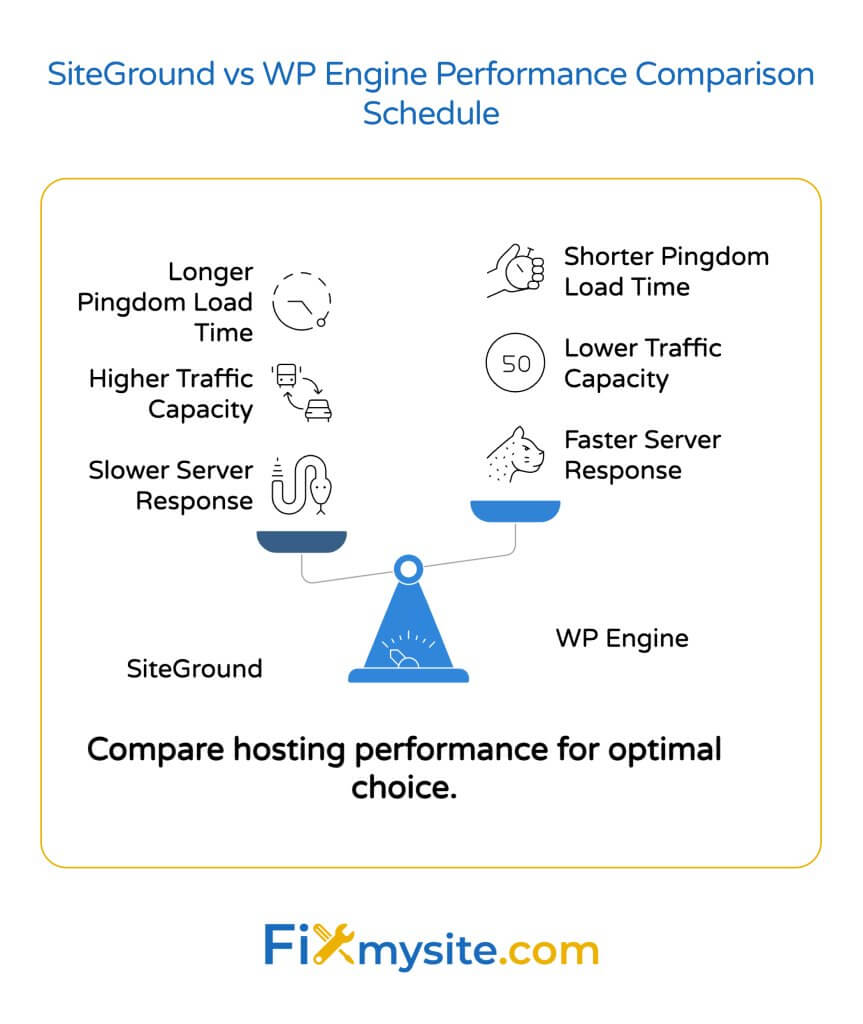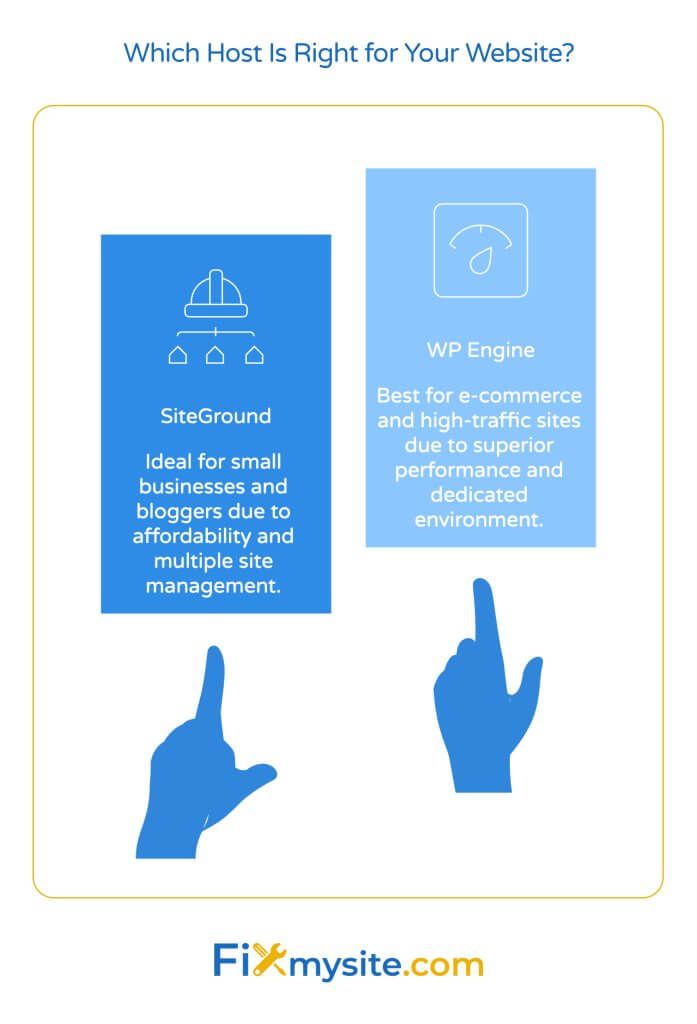
Your WordPress hosting provider forms the foundation of your website’s success. It directly impacts your site’s speed, security, and overall user experience. When your site loads quickly and stays secure, visitors are more likely to stay engaged with your content.

When comparing WordPress hosting options, SiteGround and WP Engine often rise to the top of the list. Both offer managed WordPress services but with different approaches and price points. Understanding these differences helps you make an informed choice for your specific needs.
WordPress sites face numerous technical challenges that the right hosting provider can help minimize. From security vulnerabilities to performance issues, your hosting choice plays a crucial role in maintaining a healthy website.
Why Your Hosting Choice Matters
Hosting affects every aspect of your WordPress site. It influences loading speed, which directly impacts user experience and conversion rates. Security features protect your site from various threats. And reliable uptime ensures your site stays accessible to visitors.
When selecting a WordPress host, consider these key factors:
- Performance and speed capabilities
- Security features and protection
- Reliability and uptime guarantees
- Support quality and availability
- Scalability for growth
Both SiteGround and WP Engine offer these essentials but with different strengths. Let’s explore how they compare across these and other important factors.
About SiteGround and WP Engine
SiteGround started in 2004 and has grown into a respected WordPress hosting provider. They’re officially recommended by WordPress.org and focus on combining affordable pricing with solid performance. Their approach balances cost-effectiveness with quality features.
WP Engine, founded in 2010, positions itself as a premium WordPress hosting service. They focus exclusively on WordPress hosting and offer advanced features for businesses and developers. Their higher price point reflects their specialized services and enterprise-grade infrastructure.
These different philosophies create distinct hosting experiences. Understanding these differences helps you align your choice with your website goals and budget.
Performance Comparison
Site performance impacts everything from user experience to search engine rankings. Let’s compare how SiteGround and WP Engine perform across key metrics.
Server Response Times
Server response time (measured as Time To First Byte or TTFB) shows how quickly a server begins sending data after receiving a request. WP Engine demonstrates significantly faster server response with an average TTFB of 274ms compared to SiteGround’s 1164ms in server response tests. (Source: Online Media Masters)
This difference affects how quickly your pages start loading for visitors. Faster server response times create a more responsive feel for your website. When your WordPress site experiences performance issues, server response time is often the first metric to investigate.
Traffic Handling Capabilities
How a host handles traffic spikes impacts your site’s stability during busy periods. SiteGround demonstrated impressive capacity by handling 50 virtual users (simulating approximately 50,000 monthly visits) with zero performance degradation. (Source: Cybernews)
WP Engine managed 30 virtual users (aligning with its 25,000 visit plan) without performance issues. Both hosts showed stable performance under their expected load capacities, but SiteGround demonstrated better scalability for growing sites.
| Performance Metric | SiteGround | WP Engine |
|---|---|---|
| Server Response Time (TTFB) | 1164ms | 274ms |
| Traffic Capacity Tested | 50 virtual users | 30 virtual users |
| Load Testing Result | No slowdown | No slowdown |
| Pingdom Load Time | 2280ms | 1290ms |
This performance data highlights WP Engine’s advantage in raw speed, while SiteGround offers better traffic handling capacity for growing sites.
Real-World Loading Speeds
While server response time matters, total page load time affects user experience more directly. In Pingdom tests, WP Engine sites loaded in an average of 1290ms, while SiteGround sites averaged 2280ms. Both hosts showed slower performance than some competitors in these tests.
Several factors influence these results:
- Server configuration and optimization
- Caching implementation
- Content Delivery Network (CDN) effectiveness
- WordPress optimization settings
These numbers represent averages, and your specific results may vary based on your site’s content, plugins, and theme. However, they provide a useful baseline for comparison.
Feature Comparison
Beyond raw performance, the features offered by each host determine the overall value and usability. Let’s examine the key features that differentiate SiteGround and WP Engine.
Staging Environments
Staging environments allow you to test changes before applying them to your live site. WP Engine includes staging environments on all plans, allowing easy testing of updates, design changes, and new functionality. SiteGround offers staging functionality on their GrowBig and higher plans but excludes this feature from their entry-level StartUp tier. (Source: My Codeless Website)
This difference matters for development workflows. Without staging, testing changes requires greater caution or external testing environments.
Backup Solutions
Regular backups protect your site from data loss due to errors, hacking, or other issues. WP Engine provides automated daily backups with one-click restoration on all plans. Their system also creates backup points before major updates.
SiteGround includes daily backups with a 30-day retention period on all plans. Both services allow manual backup creation, but WP Engine offers more backup points and easier restoration options on their base plans.
Caching and Optimization Tools
Caching improves performance by storing frequently accessed data for quicker delivery. SiteGround uses their custom SG Optimizer plugin for caching, which integrates directly with their server configuration. This plugin offers multiple caching levels and optimization options.
WP Engine implements server-side caching at multiple levels (object caching, page caching, and CDN caching). Their approach requires less configuration but offers fewer customization options than SiteGround’s solution.
| Feature | SiteGround | WP Engine |
|---|---|---|
| Staging Environments | GrowBig plan and higher | All plans |
| Automated Backups | Daily (30-day retention) | Daily + update points |
| Manual Backups | Yes | Yes |
| Caching Solution | SG Optimizer plugin | Server-side caching |
| Free SSL Certificates | Yes | Yes |
| Malware Scanning | Yes | Yes |
| CDN | Free Cloudflare | StackPath (paid) |
| PHP Version Control | Yes | Yes |
This comparison shows WP Engine’s more comprehensive feature set, particularly on entry-level plans. However, SiteGround offers comparable functionality at a lower price point on their mid-tier plans.
Security Features
Both hosts prioritize security but with different approaches. SiteGround implements server-level firewalls, real-time monitoring, and automatic WordPress updates. Their security measures work proactively to prevent attacks.
WP Engine offers similar protection plus additional enterprise-grade security features. They maintain dedicated security teams and implement WordPress-specific protections against common vulnerabilities.
For most users, both platforms provide strong security foundations. How can you keep your WordPress site secure beyond what your host provides? Implementing proper user permissions, strong passwords, and regular updates are essential practices regardless of your hosting provider.
Infrastructure and Technology
The underlying technology powering your hosting affects reliability, scalability, and performance. Let’s examine the infrastructure choices of both providers.
Server Infrastructure
Both SiteGround and WP Engine utilize Google Cloud Platform’s infrastructure for their hosting services. This choice provides excellent reliability, performance, and global reach. WP Engine additionally offers Amazon Web Services (AWS) integration for certain plans, providing more deployment options.
Google Cloud’s infrastructure provides:
- Global data center locations
- High-performance computing resources
- Advanced networking capabilities
- Enterprise-grade reliability
This shared foundation creates similar baseline performance, with differences emerging from how each company configures and optimizes these resources.
Content Delivery Networks (CDNs)
CDNs improve loading speeds by storing copies of your site at multiple global locations. SiteGround includes free Cloudflare CDN integration with all plans. This provides basic CDN functionality without additional cost.
WP Engine uses StackPath CDN, which requires an additional fee on most plans. Their implementation offers good performance but adds to the overall cost compared to SiteGround’s included solution.
| Infrastructure Feature | SiteGround | WP Engine |
|---|---|---|
| Server Platform | Google Cloud | Google Cloud + AWS |
| Global Data Centers | Yes | Yes |
| CDN Provider | Cloudflare | StackPath |
| CDN Included | Yes (Free) | Additional fee |
| Server Locations | 6 regions | 20+ regions |
| Container Technology | Yes | Yes |
This infrastructure comparison highlights SiteGround’s value advantage with included CDN, while WP Engine offers more server location options and infrastructure flexibility.
Pricing and Value
Cost often plays a deciding role in hosting decisions. Let’s compare the pricing structures and overall value of SiteGround and WP Engine.
Plan Comparison
SiteGround offers more affordable entry points with their GrowBig plan priced at $3.99 per month for initial terms. (Source: Dreamgrow)
WP Engine’s plans start at a significantly higher price point, with their Startup plan beginning at $20 per month. This pricing difference reflects their positioning as a premium WordPress hosting service.
Both hosts offer tiered plans based on traffic volume, storage needs, and feature requirements. As you move up the tiers, the price gap narrows somewhat, though WP Engine remains the more expensive option across comparable plan levels.
| Plan Feature | SiteGround GrowBig | WP Engine Startup |
|---|---|---|
| Starting Price | $3.99/month | $20/month |
| Websites Allowed | Multiple | 1 |
| Storage | 20GB | 10GB |
| Monthly Visits | ~25,000 | ~25,000 |
| Staging | Yes | Yes |
| Backups | Yes | Yes |
| Migration Tool | Yes | Yes |
| CDN | Included | Additional fee |
This pricing comparison highlights the significant price difference for relatively similar traffic capacity. SiteGround offers better initial value, especially for multiple sites.
Cost-to-Performance Ratio
When evaluating hosting, consider what you get for your investment. SiteGround delivers strong cost-to-performance value, especially for growing sites and multiple website owners. Their mid-tier plans offer most premium features at a fraction of WP Engine’s cost.
WP Engine justifies its premium pricing through enterprise-grade infrastructure, specialized WordPress expertise, and advanced features. For businesses where website performance directly impacts revenue, their added cost may represent a worthwhile investment.
Hidden Costs to Consider
Beyond the advertised prices, consider these potential additional costs:
For SiteGround:
- Higher renewal rates after initial term
- Additional costs for more resources as traffic grows
- Premium support for advanced issues
For WP Engine:
- CDN costs (if needed)
- Overage charges for exceeding traffic limits
- Add-on costs for additional features
Both hosts are transparent about these costs, but they affect the total investment required for your hosting.
User Experience and Control Panel
The user interface and control panel directly impact how easily you can manage your site. SiteGround offers an intuitive, custom-built Site Tools control panel. It provides clear navigation and easy access to common WordPress management tasks. Their interface works well for both beginners and experienced users. (Source: WinningWP)
WP Engine provides a specialized WordPress-focused dashboard designed for developers and agencies. Their interface emphasizes WordPress-specific tools and workflows, making common development tasks more accessible.
Both control panels allow:
- WordPress installation and management
- Domain configuration
- Email management
- File management
- Database access
- Performance monitoring
The main difference lies in their target users. SiteGround’s interface suits a broader audience, while WP Engine’s dashboard caters to more technical users and WordPress professionals.
Technical Support Quality
Support quality can make or break your hosting experience. Both hosts offer strong support options:
SiteGround provides:
- 24/7 support via phone, chat, and tickets
- Fast initial response times (usually under 10 minutes)
- WordPress-knowledgeable support staff
- Comprehensive knowledge base
WP Engine offers:
- 24/7 chat support with phone support during business hours
- WordPress experts for all support interactions
- Developer-friendly advanced support
- Extensive WordPress-specific documentation
WP Engine’s support specializes exclusively in WordPress, potentially offering deeper expertise for complex WordPress issues. SiteGround’s support covers a broader range of hosting topics with good WordPress knowledge.
Migration Options
Moving an existing WordPress site to a new host can be challenging. Both hosts offer migration tools and services to simplify this process.
Moving to SiteGround
SiteGround offers several migration options:
- Free WordPress Migration Plugin: Their custom migration plugin automates most of the transfer process
- Professional Migration Service: Available for more complex sites or multiple transfers
- Manual Migration Support: Step-by-step guidance for those who prefer to migrate manually
Their migration plugin handles most standard WordPress sites effectively, transferring files, databases, and configurations automatically. For complex sites with custom setups, their professional migration service offers a hands-off solution.
Moving to WP Engine
WP Engine provides these migration options:
- Automated Migration Plugin: Works for standard WordPress sites
- Included Migration Service: Professional migration included with new accounts
- Developer Migration Tools: For those who prefer manual control
WP Engine’s included migration service represents a significant value, especially for complex sites. Their team handles the entire process, reducing migration stress and potential issues.
Both hosts make migration relatively painless, but WP Engine’s included professional migration offers additional peace of mind, especially for mission-critical websites.
Making Your Decision
Choosing between SiteGround and WP Engine depends on your specific needs, budget, and priorities. Let’s examine which host works best for different scenarios.

Best for Small Businesses and Bloggers
For small businesses and bloggers with standard WordPress needs, SiteGround often provides the better value. Their combination of affordable pricing, solid performance, and user-friendly features creates an attractive package for:
- Budget-conscious website owners
- Multiple site managers
- Growing blogs and small business sites
- Sites with moderate traffic (under 25,000 monthly visits)
SiteGround’s lower entry price allows smaller operations to access quality WordPress hosting without overspending on unused capacity or features.
Best for Growing Websites
Sites experiencing rapid growth or handling significant traffic have specific needs. SiteGround demonstrates better cost-to-traffic scalability for growing sites. Their higher-tier plans accommodate increasing traffic volumes without proportional price increases.
For growing sites, consider:
- Current traffic versus projected growth
- Budget flexibility as traffic increases
- Required technical support level
- Development workflow needs
SiteGround’s traffic handling capabilities and value-oriented pricing make them attractive for sites on growth trajectories.
Best for E-commerce Sites
E-commerce websites have specialized requirements around security, performance, and reliability. WP Engine offers advantages for serious e-commerce operations through:
- Superior server response times
- Enhanced security features
- Dedicated environments
- Specialized WooCommerce optimizations
- Enterprise-grade infrastructure
The higher cost of WP Engine may be justified for e-commerce sites where performance directly impacts revenue. For smaller stores or those just starting out, SiteGround provides a more cost-effective solution while still offering essential e-commerce features.
| Use Case | Recommended Host | Key Benefit |
|---|---|---|
| Budget-conscious sites | SiteGround | Lower cost with solid features |
| Multiple WordPress sites | SiteGround | Multiple sites on one plan |
| High-traffic business sites | WP Engine | Better performance, dedicated environment |
| E-commerce (established) | WP Engine | Faster response times, better security |
| E-commerce (starting) | SiteGround | Cost-effective with good security |
| Developer workflows | WP Engine | Better staging, Git integration |
| Growing sites | SiteGround | Better cost-to-traffic scalability |
This comparison highlights how your specific situation should guide your choice between these quality hosting providers.

Conclusion
Both SiteGround and WP Engine offer excellent WordPress hosting with different strengths and focus areas. SiteGround provides outstanding value with good performance and features at a lower price point. They excel for budget-conscious users, multiple site owners, and growing websites.
WP Engine delivers premium performance, advanced features, and specialized WordPress expertise at a higher price point. Their service benefits high-traffic sites, established e-commerce operations, and businesses where website performance directly impacts revenue.
Your choice ultimately depends on your specific needs:
- For budget priority with solid performance: Choose SiteGround
- For maximum performance regardless of cost: Choose WP Engine
- For multiple sites with good features: Choose SiteGround
- For enterprise-grade WordPress hosting: Choose WP Engine
Remember that your hosting needs may evolve as your site grows. The right choice today should account for your anticipated future requirements as well as your current situation.
Need help migrating to your chosen host or optimizing your WordPress site’s performance? Our WordPress support services can help ensure a smooth transition and optimal configuration regardless of which host you select. WordPress care packages provide ongoing maintenance and support to keep your site running at peak performance after migration.



